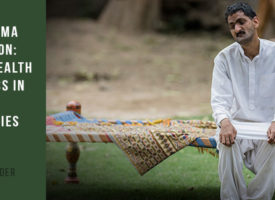The recent polio epidemic in Pakistan is not curtailed as yet. As of 2013, polio remains endemic in only three countries, Nigeria, Pakistan and Afghanistan. India only acquired the status of polio free country three years ago. China eradicated this menace a decade ago, but there was a confirmed outbreak in September, 2011. Since Pakistan shares borders with China, Afghanistan and India; it has proved difficult to confine the transmission of the disease. Especially, the fact that over decades Pakistan has given refuge to Afghans; where the virus is still highly prevalent has only worsened the situation. Poliomyelitis more commonly known called polio or infantile paralysis is an acute, viral, infectious disease spread from person to person, primarily via the fecal-oral route. Most of the refugee camps have poor sanitation conditions and most refugees do not want to get the vaccinations. On 5 May 2014, the World Health Organization (WHO) declared a public health emergency of international concern. Pakistan has sensibly taken the entire matter very seriously and has started the implementation of its extensive healthcare plan.
On Thursday, 7th August the National Assembly was informed by State Minister for National Health Services, Regulation and Coordination Sara Afzal Tarar that there are 108 reported cases of polio country wide; of that 77 are reported in FATA alone, KPK 19, Sind 10. Punjab and Baluchistan were polio free so far but unfortunately there is one case reported in each recently. The Government aims to eradicate the epidemic by the year 2015.
According to End Polio (the official website of Pakistan Government, WHO and UNICEF) there are 13 districts infected by polio countrywide in 2014, in FATA, KPK and Sind. In 2013, there were 23 infected districts, this shows that the emergency measures taken to in curtail the menace have proved successful, but the number of diagnosed cases has increased this year.
In 2011,the first National Emergency Action Plan (NEAP) for Polio Eradication was developed by the National Task Force on Polio Eradication (NTF). In 2014, the prime minister is advocating the most recent NEAP to be instrumented. The federal government aims to eradicate the poliovirus by 2015. The provincial governments are responsible for enforcing the program with technical and operational assistance by the central government, WHO and UNICEF.
The FATA, Peshawar and Karachi are recognized as the key reservoirs of the poliovirus. The polio campaigns in previous years were not successful in these areas. They were hindered, sabotaged and vaccinators were killed. Special measures are to be taken to ensure the security of the vaccinators. The drastic high number in FATA and KPK is due to the fact the parents were harassed by the Talibans in these areas. The authorities plan to work in close support from the religious clerics of the areas. Ulemas are even asked to issue Fatwas stating that polio vaccine is strictly only to provide children a happy, healthy life and immunity against this crippling disease. Pakistan has sensibly decided to vaccinate the travelers of all age groups to be vaccinated. The emergency measures are to provide immunization at the sites of transfer like, bus stands, religious shrines, and stations especially in the polio reservoir areas. An enhanced exacting strategy is developed to provide permanent vaccination at international, intra provincial and intra district border crossings.
Every child is entitled to grow, flourish, develop and become a well rounded person. It’s their right to be disability free, when a child is paralyzed the whole family gets affected and the entire nation ultimately. Let’s strive for a healthier nation, let’s not rob our children of a brighter tomorrow. Polio free Pakistan, a better Pakistan.








Education and hygiene. With these many diseases can be prevented